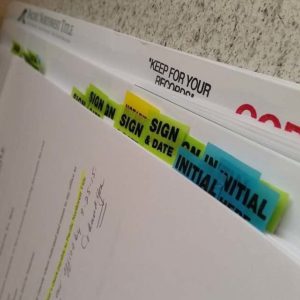
Recent South Florida Foreclosure Opinion May Take Away Another Avenue to Disprove Holder Status
Our South Florida Foreclosure Lawyers have another recent case law update stemming from an appeal from a Broward County foreclosure court. The Fourth District Court of Appeal recently ruled that anomalous indorsements appearing on a note will not affect the holder status of a party in possession of a blank indorsed note. In U.S. Bank, N.A. etc. v. Randy Becker et al., the Court held that even though there was an undated allonge endorsed from a party outside the proven chain of transfers, this did not affect the negotiability of the note or effect the holder status of the party in possession of the note when they filed the complaint and simultaneously filed the original note with the trial court.
What Does this Mean for South Florida Foreclosures?
This opinion comes under very specific, not very common facts. More often than not, in our South Florida Foreclosure Lawyers experience, when the bank or other alleged noteholder files their mortgage foreclosure complaint in South Florida they do not also file the original note with the trial court. This means it’s not always as clear that the party filing the mortgage foreclosure complaint is in actual possession of the promissory note at the time of filing. While an Ortiz presumption could still theoretically apply to this type of case, the existence of an anomalous indorsement might be sufficient contrary evidence to prevent an Ortiz presumption from attaching in the case.
The Fourth DCA noted the anomalous indorsement was not even definitive proof that the anomalous indorser was ever a holder of the note. This could be in part because the evidence of the chain of transfers was so strong in this case. In some circumstances, however, a holder will place an additional blank indorsement on a note when they transfer the note to another party as a way of providing assurances as the their rights in the note. This gives the subsequent holder an additional party to go back in sue (Breach of transfer warranties) if they end up having trouble with enforcement. This necessarily means that at some point the anomalous indorser was a holder of the note. While their blank indorsement may not have affected the transferability of the note, it does tend to indicate that that party was in possession of the note at a particular point in time.
Evidence of possession is still the name of the game. Filing the note with the court is pretty strong evidence of possession at the time of filing. Absent proving the blank indorsement was a forgery, it’s pretty hard to show that party the party in possession of a blank indorsed note isn’t entitled to foreclose.
Contact Our South Florida Foreclosure Lawyers
If you have a question about this opinion or you need a lawyer to represent you in your foreclosure matter, contact Light & Gonzalez, PLLC to speak to a qualified South Florida Foreclosure Lawyers. Our attorneys are available for consultation conveniently in Plantation Florida.









